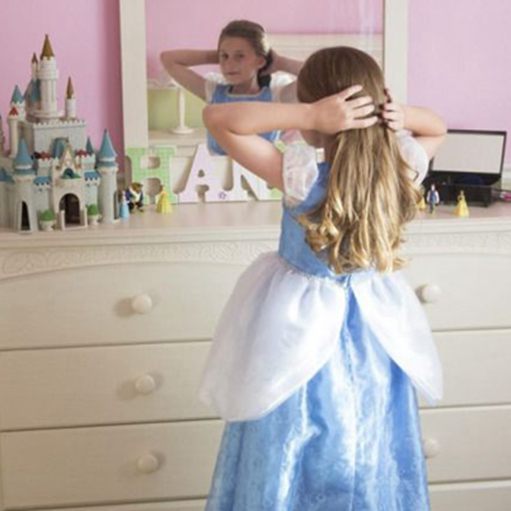导读:如果你(尤其是为人父母者)还未听说对于风靡数十年的公主文化问题的讨论的话,你应该尽量避免这种文化。杨百翰大学最新的研究为该讨论火上浇油。研究表明,对于迪士尼公的沉迷对女孩们有害。

If you’ve not yet caught wind of the decade-old princess-culture-is-problematic discussion — especially if you’re a parent — you must be actively working to avoid it. The latest study adding fuel to the fire comes out of Brigham Young University and finds that, yes indeed, folks, the Disney princess obsession can be harmful to girls.
如果你(尤其是为人父母者)还未听说对于风靡数十年的公主文化问题的讨论的话,你应该尽量避免这种文化。杨百翰大学最新的研究为该讨论火上浇油。研究表明,对于迪士尼公的沉迷对女孩们有害。
“I think parents think that the Disney princess culture is safe. That’s the word I hear time and time again — it’s ‘safe,’” lead study author Sarah M. Coyne of the Mormon institution in Utah noted in a press release. “But if we’re fully jumping in here and really embracing it, parents should really consider the long-term impact of the princess culture.”
研究首席作者Sarah M. Coyne在新闻稿中表示:“我认为父母们觉得这些迪士尼公主是无害的。我一遍又一遍地听他们说这很‘安全’。但如果我们真的让它深入我们的生活的话,父母们应该认真想想这种公主文化的长期影响。”
So, what’s the problem this time around? Same as always, confirmed the study, published in the journal Child Development, which involved the assessment of 198 preschoolers: Lots of engagement with princess culture (whether through movies or toys) can lead to gender-stereotypical behavior as well as self-critical body image.
那么,这次又是什么问题呢。和之前的研究一样,这项在《儿童发展》期刊上出版的研究评估了198名学前儿童,发现通过电影或者玩具大量接触公主文化可能会导致性别偏见行为和对于自己身体形象的自我批判。
The strict gender stereotypes can become problematic, Coyne observes, if they hold girls back. “We know that girls who strongly adhere to female gender stereotypes feel like they can’t do some things,” Coyne said. “They’re not as confident that they can do well in math and science. They don’t like getting dirty, so they’re less likely to try and experiment with things.”
Coyne发现严重的性别偏见十分有问题,会阻碍女孩们的发展。Coyne说:“我们知道忠守女性偏见的女孩们觉得她们不能做一些事情。她们不觉得自己在数学和科学上能够取的好成绩。她们喜欢整洁,所以她们不太愿意尝试做实验。”
The researchers found that 96 percent of girls and 87 percent of boys had viewed Disney princess media. Meanwhile, more than 61 percent of girls played with princess toys at least once a week, while only 4 percent of boys did the same.
研究人员发现96%的女孩和87%的男孩都看过迪士尼,超过61%的女孩每周至少玩一次公主玩偶,而只有4%的男孩会这么做。
“Disney princesses represent some of the first examples of exposure to the thin ideal,” Coyne said, echoing the many princess and Barbie critics who have come before her. “As women, we get it our whole lives, and it really does start at the Disney princess level, at age 3 and 4.”
Coyne和许多对于公主和芭比的批评持相同看法:“迪士尼公主代表了最初的消瘦审美观。作为女性,我们终身受其影响。而这种影响的的确确是在三四岁时受迪士尼公主影响开始的。”
So, what’s a parent to do, beyond the unrealistic strategy of avoiding any and all princess imagery for the entirety of a girl’s childhood? “I’d say, have moderation in all things,” Coyne suggested. “Have your kids involved in all sorts of activities, and just have princesses be one of many, many things that they like to do and engage with.” It’s also not a bad idea to discuss the good and bad of Disney Princess culture, she said — not necessarily getting too intense, but pointing out the positives and negatives about the media they consume, which is something Coyne has done with her own daughter.
那么,除了在孩子的童年时代不切实际地避免一切迪士尼之外,父母还能做些什么呢?Coyne建议道:“我觉得对于所有的事物都要有节制。让你的孩子参与到各种活动中,而迪士尼公主们只是他们想做的事情的一部分。”她还说,也可以讨论迪士尼公主文化的好与坏,但是不需要太过频繁,只要指出他们消费的媒体的好与坏即可。这也是Coyne和她女儿相处的方式。
“This study has changed the way I talk to my daughter, the things I focus on, and it’s been really good for me as a parent to learn from this study,” Coyne said. “I usually can’t say that my research findings have such a personal impact on my life.”
Coyne说:“这项研究改变了我对女儿的交谈方式和重点。作为母亲,我从这项研究中受益匪浅。通常我不会觉得我的研究对我自己的私人生活会有这么大的影响。”







